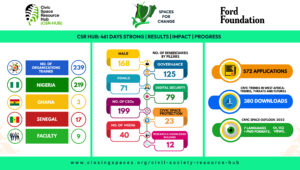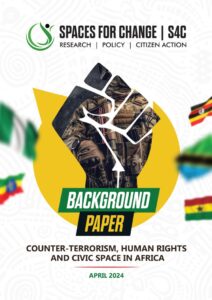Launched at a time when the civil society sector in West Africa is grappling with numerous challenges threatening its operational, financial, and institutional sustainability, the Civic Space Resource (CSR) Hub came on the scene to bolster the enthronement of an open and enabling environment for civil society to thrive in the subregion. 461 days after it was launched in May 2022, Spaces for Change | S4C has transformed what started as a journey toward reclaiming the civic space into an arena of empowerment, institutional reorganization, sustainability transitions, public-private sector collaboration, collective action, and many more.
For us at S4C, every form of advocacy and organizational action must always be powered by evidence. So, what’s the evidence that action needs to be urgently taken to weave resilience into the organizational fabric and strategies of civil society actors and groups in West Africa? And why resilience? Why is it important? What exactly are we weaving and how are doing it?
In February 2023, Spaces for Change released the report, Civic Space Trends, Threats and Futures in West Africa which found that the civic space is witnessing a spiral of decline in West Africa, with free speech and internet freedoms receiving the worst hit. According to the report, the top drivers and enablers of backsliding freedoms in the subregion include burgeoning insecurity (compounded by the activities of terrorist and extremist groups), flawed elections and the associated unconstitutional change of governments, military coups, the youth budge, the proliferation of new technologies, and so forth. The report also provided evidence of both the flashpoints and the civic actors disproportionately impacted by the tidal of civic space restrictions, as well as the future threats to anticipate and their potential perpetrators. Beyond these external shocks, the sector is also facing numerous internal challenges that inhibit its ability to respond effectively to weakening democracies and the resulting constraints on the civic space.
Based on the research findings, it became clear that urgent action must be taken to infuse resilience and prepare civil society organizations for foreseeable and unforeseeable disruptions to their social justice pursuits. Armed with this evidence, S4C knew exactly where/locations to reach, the constituencies to target, the governance and operational needs of disparate groups and the strategies that can effectively and immediately respond to their needs so that they can survive and sustain. To kickstart the resilience journey, S4C structured the identified areas of need into four strategic pillars of action:
- Governance: The Governance pillar of the Hub equips beneficiaries with the tools, resources, and capacities for strengthening their internal and corporate governance systems, addressing sustainability challenges, and improving their regulatory compliance culture.
- Digital security: This pillar opens the eyes of target groups to the magnitude of online harms associated with their work as activists, journalists and change agents while exposing them to the techniques and strategies for safely and securely navigating the complex world of digital technologies.
- Civic space protection: Under this pillar, we issued early warning signals of threats to the civic space through incident tracking of crackdowns on the civic space in West Africa on the Closing Spaces Database (www.closingspaces.org), publications, convenings, documentaries, fact sheets, policy briefers and press releases.
- Research and knowledge-building (RKB): This pillar builds the capacities of CSOs in the region to conduct credible research and undertake data-driven advocacy to defend the civic space.
461 days after, S4C has delivered capacity-building, awareness-creation, and institutional strengthening initiatives that directly benefitted a wide range of civic actors, including 199 non-governmental organizations (NGOs), 40 journalists, and media organizations operating in Nigeria, Ghana, and Senegal, totaling 239 civil society organizations in West Africa. Out of the 239 organizations across West Africa that have been directly empowered under the four strategic pillars, 2019 are from Nigeria, 3 from Ghana and 17 from Senegal. 125 organizations were empowered under the governance pillar while 79 groups under the digital security pillar, 12 organizations under the RKB and 23 organizations under the civic space protection pillar.
As if that is not enough, we recognize that closing gender gaps benefits civil society as a whole. Accordingly, among the target groups representing 239 organizations across West Africa, 168 were male while 71 were female. We continue to adopt a variety of methods to ensure that gender disparities in access to training, empowerment and resilience, are reduced to the barest minimum.
In this CSR-Hub video, beneficiaries told the stories of their journey toward resilience. These powerful stories told how the capacity-building interventions and early warning signals helped them to ward off restrictions to their operations. We have learned that empowering civil society actors and organizations activates resilience and removes the obstacles to sustained and focused civic action.
Supported by the Ford Foundation, the CSR-Hub attests to the efficacy of focused action, impact, and solid results. At Spaces for Change, we are indeed proud of this collaboration with the Ford Foundation, while the resounding success and positive impact recorded in the last 461 days inspire us to do more. We are not done yet! The journey toward a more vibrant, resilient, and empowered civil society across West Africa, has only just begun!





















